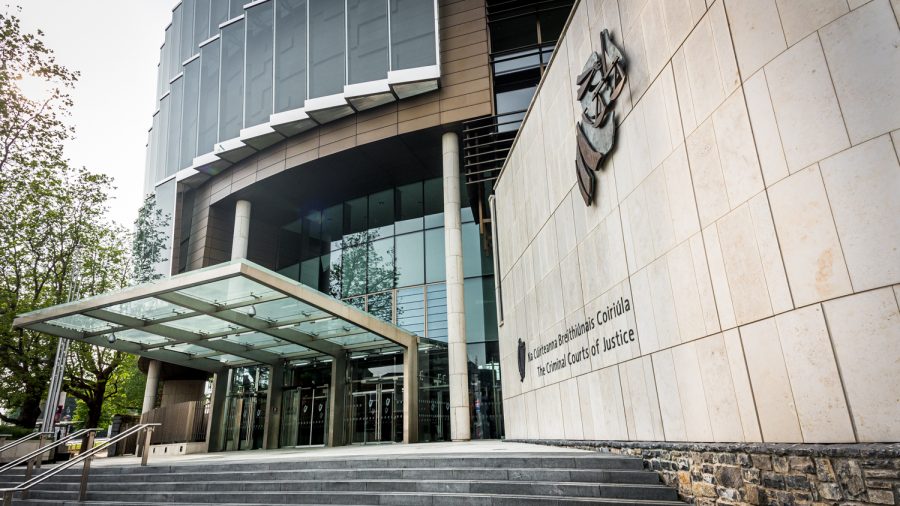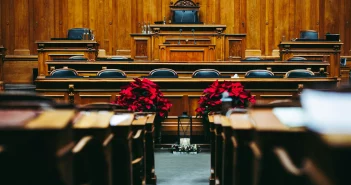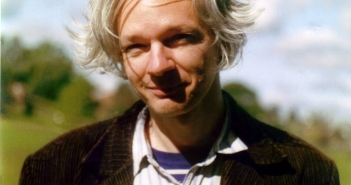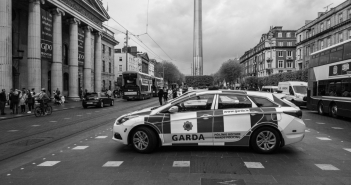On Thursday 19th of March, the Dáil passed emergency legislation in response to the Covid-19 pandemic. The Health (Preservation and Protection and other Emergency Measures in the Public Interest) Bill has two main features.
The first are financial measures assisting those affected, protecting living standards, and maintaining spending in the economy. The second aspect concerns laws permitting agents of the State to shut down mass gatherings and to order people to stay in their homes. Also, there are regulations allowing for the detention of a person, on foot of a medical recommendation, if they refuse to self-isolate.
The rapid spread of the pandemic temporarily hands necessary draconian powers to a State that has already acquired other wide-ranging powers in response to subversive activity relating to the ‘Troubles’ in Northern Ireland and, more recently, violent gangland criminality. These have long been subjected to criticism by civil liberties activists in Ireland, including Mary Robinson, as well as external bodies, concerned by the unwarranted erosion of the rule of law.
In particular, the Offences Against the State Act 1939 permits trial without jury before the Special Criminal Court. Subsequent Offences Against the State legislation created a number of special evidential provisions in response to the unique situation then at play in Ireland, including the use of ‘belief evidence’ of a Chief Superintendent before the Court and the drawing of ‘adverse inferences’ from the silence of a suspect in custody.
Interestingly, the Special Criminal Court became the focus of a lengthy exchange during the leaders’ debate on RTÉ prior to February’s election, with Sinn Féin President Mary Lou McDonald repeatedly being asked to clarify her party’s position on the issue.
Indeed, Fine Gael leader Leo Varadkar went so far as to rule out a coalition with Sinn Féin based on its purported view on the Court; his Fianna Fáil counterpart Micheál Martin then claimed that Sinn Féin always votes against the renewal of the Offences Against the State legislation on instruction from ‘their IRA old comrades.’[1]
The problem with handing over such powers to the State is that once granted they are not easily relinquished, as the police and judiciary grow accustomed to their exercise. This has been the case with the Special Criminal Court that now sits in the impressive and imposing Criminal Courts of Justice building on Parkgate Street in Dublin.
Protecting civil liberties, such as the right to jury trial, may seem less important as long as extraordinary powers are not abused. However, the existence of special powers poses the ongoing risk that they may be exploited by unscrupulous, or even tyrannical, politicians or agents of the state.
This article provides background on the emergence of the Special Criminal Court, and the general criticisms that have been directed against the use of a non-jury trial, followed by an assessment of its use against organised crime. It also posits potential alternative practices that could be used to protect endangered juries. As we enter a prolonged period of draconian measures restricting our conduct it is salutary to consider the powers already at the disposal of the State.
General Criticisms in the Use of a Non-jury Court
The current Special Criminal Court has been subject to general criticism since its establishment in 1972. The justification for the existence of a non-jury court centred on the potential for juror intimidation and the fear that jurors could be coerced in their decision-making. In announcing the establishment of the Special Criminal Court, the then Minister for Justice, Desmond O’Malley, referred to the prevalent atmosphere of intimidation in courthouses and the threat of retaliation.[2]
In response, a statement from the ‘Citizens for Civil Liberties’ on 26 May 1972 expressed the concern that the establishment of the Court would deprive citizens of the right to jury trial.[3] The introduction of belief evidence later that year[4] also sparked criticism from members of the academic community. Writing in 1974, Mary Robinson stated that, ‘in effect, this would not even be a case of one man’s word against another, but a case of belief which was based on undivulged facts and derived from undivulged sources – which could only be at second or third hand – being set against another man’s assertions’.[5]
While the workload of the Special Criminal Court declined noticeably over the following decade, this appears to have been the result of a decline in subversive activity rather than the result of a policy change on behalf of the DPP.[6]
Writing in 1989, Hogan and Walker noted the lack of political pressure to have the court disbanded and posited that this might be a tribute to the fairness and impartiality of the operation of the Special Criminal Court since 1972. However, they wrote that this also provided ‘disquieting evidence of the “seepage” of emergency legislation into the ordinary law of the State. What was once seen as a radical (and purely temporary) departure from standard norms has now become an accepted feature of the criminal justice system’.[7]
While in 1996 the Supreme Court indicated the necessity that the Special Criminal Court be kept under constant review, it refused to find that the system was unconstitutional.[8]
Human Rights Committee
The use of the Special Criminal Court was criticised by the Human Rights Committee in 2001, which found that the State was in breach of the right to equal treatment, espoused by Article 26 of the United Nations Covenant on Civil and Political Rights, given the power of the DPP to certify trial in the Special Criminal Court.[9]
The Committee found the State to be in breach of the obligations under Article 26 and stated that it was critical to its conclusion that the DPP was under no obligation to provide reasons and that judicial review of his decision was ‘restricted to the most exceptional and virtually undemonstrable circumstances’.[10]
In its 2002 report, the minority of the Committee to Review the Offences Against the State Acts 1939–1998, which consisted of Hederman J. and Professor Dermot Walsh, focused on the primacy of the right to trial by jury, which they described as ‘a cornerstone of the criminal law system’ which ‘ensures that the innocence or guilt of a person charged with an offence is determined by twelve randomly chosen members of the community, each of whom brings to the process the benefit of his or her life-experience and individual perspective.’[11]
They noted that the risk of possible jury intimidation is reduced, that the members of the Court can be relied on not to be swayed by political views from convicting where the offence was politically inspired and that the prospects of conviction may be considered more likely, ‘not because the members of the Court are unfair but because studies have consistently shown that non-jury courts have a higher conviction rate than courts with trial by jury’.[12]
Furthermore, Professor Dermot Walsh in his dissenting comments in the Report of the Committee to Review the Offences Against the State Acts 1939–1998 argued that such exceptional criminal justice measures would, under the guise of combating terrorism, cause more lasting damage to basic democratic values and the rule of law than ‘the terrorists could ever hope to have achieved,’ and suggested the replacement of the standards underpinning the Offences Against the State legislation with ‘standards that are more firmly rooted in due process, civil liberties and human rights’.[13]
In contrast the majority of the Committee stated that ‘as long as there is in existence a paramilitary threat to public peace and order, the need for the Special Criminal Court will probably remain.’
In light of the majority recommendations, the operation of the Special Criminal Court has been maintained, despite on-going controversy in the context of organised crime, which is discussed below.
Meanwhile, most of the recommendations made by the Committee to Review the Offences Against the State Acts 1939–1998 intended to align the legislative provisions with human rights norms have not been implemented and have largely been ignored by the State.
In its 2014 report on Ireland, the United Nations Human Rights Committee highlighted its continued concern ‘at the lack of a definition of terrorism under domestic legislation and the continuing operation of the Special Criminal Court’.[14]
The UNHR Committee called on the State to ‘introduce a definition of “terrorist acts” in its domestic legislation, limited to offences which can justifiably be equated with terrorism and its serious consequences’ and to consider the abolition of the Special Criminal Court completely. [15]
Trial of Organised Crime in the Special Criminal Court
In 2002, the majority of the Committee to Review the Offences Against the State Acts 1939–1998 reported that juries in Ireland are ‘distinctly uncomfortable’ in cases involving organised crime and that attempts have been made to tamper with juries in high profile criminal trials in the ordinary courts. The Committee felt that the threat posed by organised crime was sufficiently serious to justify the continuation of the Special Criminal Court on that ground alone.[16] In DPP v Special Criminal Court & Ward,[17] Carney J stated:
Those engaged in [organised]crime require a wall of silence to surround their activities and believe that its maintenance is necessary for their protection. They have at their disposal the resources, including money and firearms, to maintain this wall of silence and will resort to any necessary means, including murder, in furtherance of this objective.[18]
It has been suggested that organised criminality is not ‘ordinary’ crime as such and measures akin to those used against suspected terrorists are warranted.[19]
Criminal Justice Act 2009
Despite the foregoing, the use of the Special Criminal Court for the purposes of non-subversive and organised crime has sparked heated debate in recent years. For example, the Criminal Justice Act 2009 was urgently passed through the Dáil against a background of increasing gangland violence and it evoked great controversy, with many lawyers publicly opposing it.
A large group of lawyers penned a letter to The Irish Times expressing their dissatisfaction with the content of the Act and the manner in which it was rushed through the Houses of the Oireachtas. Among the complaints was the fact that the Act had been:
… introduced without any research to support its desirability and without canvassing expert opinion or inviting contribution from interested parties on the issues. It appears now that it will be passed without proper debate in the Dáil because such debate has been guillotined by the Government. It is quite simply astounding that we as a society would jettison ancient rights and rules of evidence in such a manner and seemingly without regard to the effect such impetuous legislating might ultimately have on the respect for the rule of law in this country.[20]
It was further argued, in relation to the Act’s provision for applications to extend time in detention to ‘be heard otherwise than in public’ and to the possible exclusion of the accused and his legal representatives,[21] that ‘the provision for secret hearings to extend detentions without the presence of the suspect or their lawyer’, was a stark departure from the principle that justice should be administered in public. The letter set out that:
Secret hearings should be anathema to a system based on the rule of law. From the manner in which detention hearings are currently conducted, there is nothing to suggest that investigations would be compromised. In the main the court hears generalised evidence about the necessity for further time to carry out interrogations, forensic testing or assessment of evidence.[22]
The Irish Council for Civil Liberties also criticised the encroachments on the rule of law:
[T]his provision fundamentally alters the nature of criminal justice in Ireland. It allows for the judge to hear evidence of a Garda of any rank, in private, and without legal representation, in order to justify the continuing detention of a person … In essence what this means is that a person can be held without knowledge of the grounds on which the judge is justifying their continued detention. This detention can be justified by the secret information from any member of the Garda Síochána, regardless of his or her expertise or experience.
In 2014, the United Nations Human Rights Committee expressed particular concern ‘at the expansion of the remit of the Special Criminal Court to include organized crime’.[23]
Flouting Human Rights
With the announcement of the second Special Criminal Court in 2015, the debate regarding the justification and role, if any, of the Special Criminal Court, resurfaced. In June 2015, the Minister for Justice, Frances Fitzgerald, informed the Seanad that:
Organised crime continues to present a significant law enforcement issue, with a number of criminal gangs continuing to engage in serious crimes. There is, unfortunately, stark evidence of the willingness of these gangs to engage in murder, armed robbery, kidnapping, drug smuggling, counterfeiting and other serious offences. We are also faced with the reality that there are growing links between paramilitary groups and organised crime. Given the nature of organised crime, the investigation and prosecution process can be lengthy and difficult.[24]
In October 2015, the Director of the Irish Council for Civil Liberties shared an alternate view:
The Special Criminal Court was created as an extraordinary court in extraordinary times; however, no reasonable person could today claim that there is a public emergency threatening the life of the nation. It is therefore unjustified that this Court’s procedures suspend fundamental fair trial guarantees, including the right to trial by jury. The UN Human Rights Committee has repeatedly identified the Special Criminal Court as being in violation of Ireland’s legal obligations under international human rights treaties and called for its abolition. In 2014 the Committee expressed particular concern ‘at the expansion of the remit of the Special Criminal Court to include organised crime’.
The continuation, much less the expansion, of such a court in peacetime flouts Ireland’s human rights obligations and is not necessary in a democratic society. Crime, particularly violent and gang crime, are a legitimate concern for our legislators. Tackling such crime must not rely, however, on chipping away at the right to a fair trial, but on a commitment to adequately resourcing An Garda Síochána and the regular Courts.[25]
More recently, in November 2018, the UN Special Rapporteur on the Promotion and Protection of Human Rights and Fundamental Freedoms while Countering Terrorism, Professor Fionnuala Ní Aoláin, commented on the Special Criminal Court regime.
At a lecture hosted by the Irish Council for Civil Liberties (ICCL) and the International Network of Civil Liberties Organisations (INCLO), she stated that ‘the Island of Ireland, more so than many parts of the world has experienced emergency law, emergency practice and the seepage of the exceptional into the ordinary in ways that has not served the rule of law nor the protection of human rights well.’ She pointed out that there had been ‘consistent and trenchant concerns about the use of the Special Criminal Court and the Offences Against the State Act as a “work-around” the ordinary protection of the law’.[26]
The Future
There is a genuine risk that the use of non-jury trial, originally an emergency measure, is becoming normalised. It is disappointing that the debate and dialogue in Ireland surrounding the Special Criminal Court have primarily revolved around two poles; jury or non-jury trial. There has been little political discussion of intermediate alternatives for protecting jurors, which, in modern times, might include the use of technological solutions to some of the problems posed by potential jury intimidation.
One possibility would be to allow the jury to observe proceedings from a remote location, though it must be acknowledged that such protective measures may have a prejudicial effect and may invite the jury to draw negative connotations about the culpability of the accused. Options such as transporting the jury to their homes or taking steps to anonymise the jury[27] may not be as feasible in Ireland given the small size of the country and would again involve the risk of prejudice towards the accused where the jury members are aware of the protective measures taken. A more realistic option to prevent juror intimidation would be to limit the right to inspect the panel from which the jury is drawn, as has been done in Northern Ireland.[28]
If the Special Criminal Court is to remain in being, it would be preferable that the decision regarding form of trial should lie with the courts rather than the DPP or the legislature.[29] Instead of using a system of scheduling a vast number of offences which are presumptively tried before the Special Criminal Court, each case should be considered on an individual basis.[30]
The right to jury trial was described by Thomas Jefferson as ‘the only anchor ever yet imagined by man, by which a government can be held to the principles of its constitution.’[31] One would have thought that in light of the high status formally accorded to trial by jury in the Irish Constitution, these alternatives would merit serious consideration.
Conclusion
The current Special Criminal Court was established in 1972 as an emergency measure in response to a unique set of circumstances then at play in Ireland. It would appear, however, that the court now has de-facto permanency in our criminal justice system. While the majority of trials in the Special Criminal Court continue to involve subversive activity, prosecution of organised crime in the court is increasing and a situation has now arisen where emergency powers have become normalised.
Now, as the Government responds to an unusual situation for Ireland with emergency legislation, it is worthwhile to bear in mind the earlier response to subversive activity in Ireland and – in the words of Hogan and Walker – the ‘disquieting evidence of the “seepage” of emergency legislation into the ordinary law of the State.’
[1] Ceimin Burke, ‘Explainer: What is the Special Criminal Court and what is Sinn Féin’s stance on it?’, The Journal, February 6th, 2020, https://www.thejournal.ie/special-criminal-court-explainer-4993281-Feb2020/
[2]Davis, The History and Development of the Special Criminal Court 1922–2014 (Bloomsbury Professional, 2014) 169, citing 261 Dáil Debates (15 June 1972), col 1765.
[3]McInerney, ‘Special Courts Introduced’ (1972) The Irish Times, 27 May, 9.
[4]‘Belief evidence’ was introduced by the Offences Against the State (Amendment) Act 1972, s 3(2), which was passed on 3 December 1972. The provision is discussed in detail in Ch 6.
[5]Robinson, The Special Criminal Court (Dublin University Press, 1974) 31.
[6]Hogan and Walker, Political Violence and the Law in Ireland (Manchester University Press, 1989) 237.
[7]Hogan and Walker, Political Violence and the Law in Ireland (Manchester University Press, 1989) 239.
[8]Kavanagh v Ireland [1996] 1 IR 321.
[9]The powers of the DPP in this regard are discussed in detail in Ch 2.
[10]Kavanagh v Ireland, Decision of the UN Human Rights Committee (CCPR/C/71/D/819/1998, 4 April 2001), at para 10.2.
[11]Hederman et al, Report of the Committee to Review the Offences Against the State Acts 1939–1998 (2002), at paras 9.88–9.
[12]Hederman et al, Report of the Committee to Review the Offences Against the State Acts 1939–1998 (2002), at para 9.90.
[13]Hederman et al, Report of the Committee to Review the Offences Against the State Acts 1939–1998 (2002), 255–261.
[14]United Nations Human Rights Committee, ‘Concluding observations on the fourth periodic report of Ireland’, CCPR/C/IRL/CO/4 (19 August 2014). The Committee had previously expressed concern in 1993 (Comments of the Human Rights Committee, CCPR/C/79/Add 21 (3 August 1993)); 2000 (Report of the Human Rights Committee, Vol I, Gen Ass, 55th Sess, Supp No 40, A/55/40 (10 Oct 2000)); 2008 (Concluding observations of the Human Rights Committee: Ireland’, CCPR/C/IRL/CO/3 (30 July 2008)); and 2013 (‘Report of the Special Rapporteur on the situation of human rights defenders, Margaret Sekaggya: Addendum to Ireland’ A/HRC/22/47/Add.3 (26 February 2013)).
[15]United Nations Human Rights Committee, ‘Concluding observations on the fourth periodic report of Ireland’, CCPR/C/IRL/CO/4 (19 August 2014).
[16]Hederman et al, Report of the Committee to Review the Offences Against the State Act 1939–1998 (2002), at paras 9.33–9.36.
[17]DPP v Special Criminal Court & Ward [1999] 1 IR 60.
[18]DPP v Special Criminal Court & Ward [1999] 1 IR 60, 63.
[19]Campbell, Organised Crime and the Law: A Comparative Analysis (Hart Publishing, 2013) 128.
[20]Undersigned Solicitors and Barristers, ‘Criminal Justice (Amendment) Bill’, (Letter to the Editor) (2009) The Irish Times, 8 July.
[21]Pursuant the Criminal Justice Act 2007, s 50(4A).
[22]Undersigned Solicitors and Barristers, ‘Criminal Justice (Amendment) Bill’, (Letter to the Editor) (2009) The Irish Times, 8 July.
[23]United Nations Human Rights Committee, ‘Concluding observations on the fourth periodic report of Ireland’, CCPR/C/IRL/CO/4 (19 August 2014).
[24]Seanad Debates, Vol 240 No 9 (11 June 2015). The Minister was speaking to the Seanad in support of a resolution to continue in operation s 8 of the Criminal Justice (Amendment) Act 2009, which adds certain ‘organised crimes’ to the schedule of offences that can be tried before the Special Criminal Court.
[25]‘Special Criminal Court Decision ‘Flouts Rule of Law’, says ICCL’, ICCL Press Release (29 October 2015). https://www.iccl.ie/press-release/special-criminal-court-decision-flouts-rule-of-law-says-iccl/ accessed 20 January 2019.
[26]‘UN expert criticises the Special Criminal Court and the Offences Against the State Act’, ICCL Press Release (21 November 2018).
[27]These steps include referring to them by number only, housing them in a secret location and monitoring their calls, as occurred in United States v Gotti 777 F Supp 224 (EDNY 1991).
[28] Juries (Northern Ireland) Order 1996 (SI 1996/1141 (NI 6)), Art 26A, as inserted by the Northern Ireland Act 2007, s 10. This was found not to breach the Art 6 right to a fair trial in Re McParland [2008] NIQB 1. See Campbell, ‘The prosecution of organised crime: removing the jury’, (2014) 18(2) IJEP 83, 97. See also, the recent recommendations of Seymour CB in relation to non-jury trials in Northern Ireland (Seymour CB, Report of the Independent Reviewer Justice and Security (Northern Ireland) Act 2007, Tenth Report 1 August 2016 – 31 July 2017 (Her Majesty’s Stationery Office, April 2018), at para 23.2).
[29]As suggested by Campbell (Campbell, ‘The Prosecution of Organised Crime: Removing the Jury’ (2014) 18(2) IJEP 83, 100).
[30]This proposal was suggested by Dr Liz Campbell in her article, ‘The Prosecution of Organised Crime: Removing the Jury’, (2014) 18(2) IJEP 83, 100. It may be noted that, in England, Wales and Northern Ireland, the Criminal Justice Act 2003, Pt VII, which was commenced in January 2007, provides that trials on indictment may be held without a jury in cases where there is a risk of jury tampering. Under s 45 of the 2003 Act, the parties will attend a preparatory hearing prior to the decision to hold a non-jury trial and are given an opportunity to make representations with regard to the decision. This safeguard does not apply where non-jury trial is certified in relation to offences with a political or religious motivation in Northern Ireland under the Justice and Security (Northern Ireland) Act 2007 and is non-existent in Ireland. As Independent Reviewer of the powers under the Justice and Security (Northern Ireland) Act 2007, David Seymour CB has proposed that the Public Prosecution Service could, once they have formed a view that a non-jury trial certificate should be issued but before the submission goes to the DPP, notify the defendant that they are minded to issue a certificate, specifying the condition or conditions and any other material which is in the public domain, and invite representations within a specified period. This would lead to increased transparency in the process, a reduction of the risk of judicial review and to circumstances where the final decision of the DPP would be fully informed, particularly if the defence made coherent and plausible representations that, for example, the conditions relied on were not met. (Seymour, Report of the Independent Reviewer Justice and Security (Northern Ireland) Act 2007, Tenth Report 1 August 2016–31 July 2017 (Her Majesty’s Stationery Office, April 2018), at para 23.3).
[31] The Papers of Thomas Jefferson, vol. 15, 27 March 1789 – 30 November 1789, ed. Julian P. Boyd. Princeton: Princeton University Press, 1958, pp. 266–270. ‘From Thomas Jefferson to Thomas Paine, 11 July 1789,’ Founders Online, National Archives, accessed September 29, 2019, https://founders.archives.gov/documents/Jefferson/01-15-02-0259.




